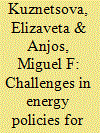| Srl | Item |
| 1 |
ID:
176793


|
|
|
|
|
| Summary/Abstract |
The accessibility and reducing cost of distributed renewable energy sources are stimulating the emergence of small-scale residential prosumers who can produce and consume electricity. This may lead to various scenarios. Such prosumers may increase the uncertainty of consumption behavior, reduce consumption from the grid, and eventually disconnect from the grid. However, they may remain connected, and their energy potential can provide flexibility for the overall system. Current policy in some jurisdictions promotes disconnection through tax increases, grid charges, and other non-commodity costs. In particular, in Ontario (Canada) only 8.7% of the typical electricity bill covers the cost of energy and power; the remainder subsidizes governmental energy-procurement contracts, compensates the grid, pays for environmental initiatives, and covers other taxes. The situation is aggravated by a lack of a global vision for the energy system and of coordinated actions to achieve this vision. We support the preferred scenario in which prosumers remain connected to the grid. As an alternative to Ontario's current attempts to artificially slow the increase in electricity prices, we present an extended critical survey of energy policies to motivate a thoughtful reconsideration of current schemes for the economic integration of prosumers in the energy system.
|
|
|
|
|
|
|
|
|
|
|
|
|
|
|
|
| 2 |
ID:
150675


|
|
|
|
|
| Summary/Abstract |
The importance of renewable energy as a response to climate change is universally acknowledged. However, its successful implementation requires public approval and cooperation. This study aims to identify the level of renewable energy acceptance in Korea by estimating Korean consumers’ additional willingness to pay (WTP) using the contingent valuation (CV) method, which is the most widely used to analyze consumer preferences. The estimation results indicate that Korean consumers are willing to pay an additional USD 3.21 per month for electricity generated with renewable energy. However, WTP in Korea is low relative to other advanced nations, indicating that these values could be influenced through policies aimed at improving knowledge and acceptance of renewable energy sources among Korean consumers.
|
|
|
|
|
|
|
|
|
|
|
|
|
|
|
|
| 3 |
ID:
177384


|
|
|
|
|
| Summary/Abstract |
The supply of electricity from renewable energy sources (RESs) represent one of the key measures to reduce environmental impacts on the basis of the new decarbonization target set by the European Union. However, the expected benefits do not refer only to the decrease in fossil fuel demand and the reduction of environmental impacts. Among the social impacts, employment increase represents one of the most important benefits, especially in a period of crisis economy. This paper aimed to investigate the potential of investments in the energy sector in Italy through the application of the Input-Output analysis. The assessment outcomes were tested investigating the PNIEC (Piano Nazionale Integrato per l’Energia e il Clima) provided by the Ministry of Economic Development in 2020. Specifically, the power systems that PNIEC planned to install until 2040 were analyzed, focusing on wind, photovoltaic, hydroelectric and geothermal infrastructures. The results showed that RESs investments can have a strong positive impact on the Italian economy both directly and indirectly. Sensitivity analyses highlighted that the import share of primary components of RESs strongly influences occupational performance, particularly for PV systems.
|
|
|
|
|
|
|
|
|
|
|
|
|
|
|
|